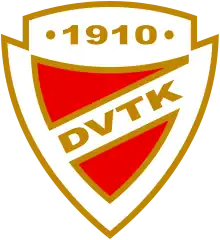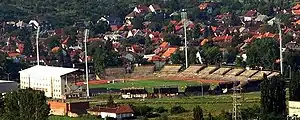Diósgyőri VTK
Diósgyőr-Vasgyári Testgyakorlók Köre, more commonly Diósgyőri VTK (Hungarian: [ˈdioːʒɟøːri ˈveːteːkaː]) is a Hungarian sports club from Diósgyőr district of Miskolc best known for its football team. Founded in 1910 by the local working class youth, the team plays in the first division of the Hungarian League and has spent most of its history in the top tier of Hungarian football. Diósgyőr is best known for its passionate supporters – in the past years Diósgyőr had one of the highest average attendances in the Hungarian top division.[1] The football club enjoyed its first golden age in the late '70s and early '80s, including a third place in the 1978–79 season of the Hungarian League and two Hungarian Cup triumphs in 1977 and 1980.
 | |||
| Full name | Diósgyőr-Vasgyári Testgyakorlók Köre | ||
|---|---|---|---|
| Nickname(s) | Diósgyőr | ||
| Short name | DVTK | ||
| Founded | 6 February 1910 | ||
| Ground | Diósgyőri Stadion, Miskolc | ||
| Capacity | 15,325 | ||
| Chairman | Gergely Sántha | ||
| Head coach | Zoran Zekić | ||
| League | NB I | ||
| 2019–20 | NB I, 9th of 12 | ||
| Website | Club website | ||
|
| |||
| Active departments of DVTK | ||||||||||||
|---|---|---|---|---|---|---|---|---|---|---|---|---|
|
History
Crest and colours
Naming history
- 1910–38: Diósgyőri VTK
- 1938–45: Diósgyőri MÁVAG SC
- 1945–51: Diósgyőri VTK
- 1951–56: Diósgyőri Vasas
- 1956–92: Diósgyőri VTK Miskolc
- 1992–00: Diósgyőr FC
- 2000–03: Diósgyőri VTK
- 2003–04: DVTK 1910
- 2004–05: Diósgyőri Balaton FC (later Diósgyőri VTK-BFC)
- 2005–07: Diósgyőri VTK
- 2007–08: Diósgyőri VTK-BORSODI
- 2008–: Diósgyőri VTK
Manufacturers and shirt sponsors
The following table shows in detail Diósgyőri VTK kit manufacturers and shirt sponsors by year:
| Period | Kit manufacturer | Shirt sponsor |
|---|---|---|
| −2008 | saller | Szeviép / Regale Klíma |
| 2008 | – | |
| 2009 | Szeviép / É.M.K. | |
| 2009–2010 | Erreà | AVE / Jánosik és TSA. / É.M.K. |
| 2010–2011 | AVE | |
| 2011–2013 | Nike | – |
| 2014–2018 | Borsodi | |
| 2018– | 2Rule | Borsodi |
Stadia and Facilities

The home of the club is the multi-purpose Diósgyőri Stadion located in Miskolc, Borsod-Abaúj-Zemplén County, Hungary. The maximum capacity of the stadium is approximately 17 000 spectators.
The played their matches from 1911 to 1939 near the canteen of the Diósgyőr Ironworks. The stadium was first opened on 25 June 1939.
In 1968 the stadium has undergone major expansions and the capacity has increased to 22,000. The stadium was then reopened after renovations on 26 May 1968. At that time, it was the biggest stadium in Hungary outside of Budapest. The highest attendance record for the stadium was set on 27 November 1968, when approximately 35,000 people saw a match between the DVTK and the Ferencvárosi TC. in the 2000s its capacity was dropped to 15,000 due to security reasons sections of the stadium was closed from the public.
Prior to demolition in 2016 the stadium had the following areas: the western Main Stand that was built in 1939. Three other wings were built in 1968, with a grass surface and a tartan covered running track, where football matches and athletic championships are held. The Complex contains one grass surfaced training field built in 1977, one with artificial turf built in 2006, and two others with cinder covering that opened in the 1960s. The artificial grass field has lighting. Near the stadium there is a covered training field and a former boxing arena re-opened for soccer in 2009. Although the stadium does not meet the standards of many other European stadiums, it is the most modern arena in Eastern Hungary. Floodlighting was installed and began operating on 15 November 2003.
The Main Stand had its first renovation in 2005–06 and after a significant modernization project, it was opened on 23 April 2006 with a roof over 1,504 seats. In 2009–2010 the eastern-wing of the 40-year-old stands was demolished. For the 100th birthday of the club, new covered stands were built with a buffet, restrooms, and 3,137 seats on the so-called "Sunny wing" or "Napos oldal". This wing was so-named because the sun would make it difficult for fans to watch matches during afternoon competition. Construction began on 10 August 2009 and an opening ceremony was held on 6 March 2010. The 2009–10 renovation cost 400 million HUF. In 2011–2012, the training fields were modernized, and two additional fields were built. Currently, there are four training fields with floodlights, two with natural grass and 2 with artificial grass.
From 1992 to 2000, the field was named DFC Stadium due to the club changed its name from DVTK to Diósgyőri Football club. During the 2007–2008 season the name of the stadium was DVTK-Borsodi Stadium, because of a sponsorship arrangement.
A famous section of the stadium called the Csáki-stand is named after the fan, József Csáki.

In 2016 the construction of a new stadium has been started.
On 20 June 2017, it was announced that Diósgyőr is not able to play their home matches at the Mezőkövesdi Városi Stadion due to the turf cannot endure it. As a consequence, Diósgyőr will play the home matches of the 2017–18 Nemzeti Bajnokság I matches at stadium of Debreceni VSC', Nagyerdei Stadion, in Debrecen.[2]
On 5 May 2018, the new stadium was opened officially.[3] The first official match was played between Diósgyőr and Mezkőkövesd in the 2017–18 Nemzeti Bajnokság I season. The match ended with a 1–0 win for the Borsod-rival Mezőkövesd. The first goal was scored by Dražić in the 88th minute of the game.[4]
Supporters
Diósgyőr has one of the most supporters in Hungary and almost everybody in the town is fond of football. In the 2007–08 season, the average number of attendance in Diósgyőr matches was 5063, with DVTK being the most visited team in NB I. On the season peak, 10,000 fans encouraged the team. In the 2011–12 season, the average number of fans was 7793, with the most visited team at the top, while the season peaked at 11,398 at the stadium, which meant a full house. The relationship with the Nyíregyháza, Ferencváros and Újpest supporters is particularly bad. DVTK fans have previously sympathized with the other red and white team in East Hungary, DVSC supporters. In recent years, a friendly relationship with the supporters of Szeged has evolved and they have a friendship with the Polish fans of GKS Bełchatów.
On 19 July 2014, UEFA issued sanctions against Ferencváros and Diósgyőr and Slovakia’s Spartak Trnava, following racist behaviour by their fans during 2014–15 UEFA Europa League qualifying matches against Maltese sides Sliema Wanderers, Birkirkara and Hibernians respectively. Ferencvaros were the hardest hit by the UEFA measures as club were fined by €20,000 and the partial closure of their stadium following monkey chants and racist banners displayed in both legs in Malta and Hungary.[5]
Honours
League
- Nemzeti Bajnokság II:
- Winners (6): 1949–50, 1953, 1956, 1962–63, 1973–74, 2010–11
- Runners-up (3): 1965, 1990–91, 1996–97
Players
Current squad
- As of 15 January 2021[6]
Note: Flags indicate national team as defined under FIFA eligibility rules. Players may hold more than one non-FIFA nationality.
|
|
Out on loan
Note: Flags indicate national team as defined under FIFA eligibility rules. Players may hold more than one non-FIFA nationality.
|
|
Non-playing staff
Board of directors
| Position | Name |
|---|---|
| Chief executive officer | |
| Executive assistant | |
Management
| Position | Name |
|---|---|
| Technical director | Vacant |
| Head coach | |
| Assistant coach | |
| Fitness coach | |
| Goalkeeping Coach | |
| Masseur | |
| Reserve team coach | |
| Under 19 Coach | |
| Under 17 Coach | |
| Video Analytics | |
Statistics
Record departures
|
Record arrivals
|
See also
References
- "Stagnál a nézőszám az NB I-ben". rangado.hu. 17 April 2014.
- "NB I: nem Mezőkövesd lesz a DVTK otthona az új szezonban". Nemzeti Sport. 20 June 2017.
- "Rémálomba fordult ünnep – új stadionjában kapott ki a DVTK". Nemzeti Sport. 5 May 2018.
- "2017–18 Nemzeti Bajnokság I: Diósgyőr 0–1 Mezőkövesd". Soccerway.com. 5 May 2018.
- "UEFA punish clubs for racist abuse against Maltese teams". Times of Malta. 19 July 2014.
- "Diósgyőri VTK (játékosok)" (in Hungarian). Diósgyőri VTK.
- "DVTK: Kádár Tamás 400 ezer euróért távozik – sajtóhír". Nemzeti Sport. 29 January 2015.
- "Lech: Kádárért 450 ezer eurót fizettek, Holmanért 100 ezret – sajtóhír". Nemzeti Sport. 2 February 2015.
- "DVTK: "jelentős összeg" a klub számláján Elek eladása után". Nemzeti Sport. 2015.
Sources
Lajos Varga: Diósgyőri Futballtörténet (Diósgyőr Soccerhistory)
External links
- Official website (in Hungarian)
- Friends for the Diósgyőr Football (in Hungarian)
- Amíg Élek Én fan site (in Hungarian)